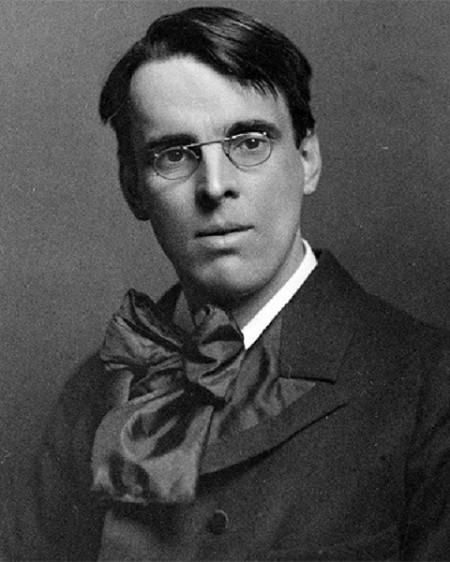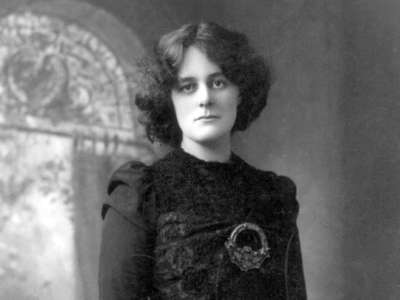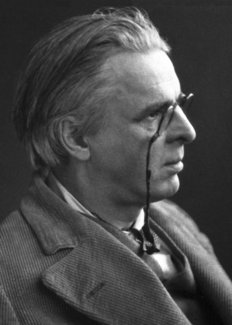
William Butler Yeats (June 13, 1865 – January 28, 1939) was an Irish poet, dramatist, prose writer and one of the foremost figures of 20th-century literature. A pillar of the Irish literary establishment, he helped to found the Abbey Theatre, and in his later years served two terms as a Senator of the Irish Free State. He was a driving force behind the Irish Literary Revival along with Lady Gregory, Edward Martyn and others.
Early Life
William Butler Yeats was born on June 13, 1865, at Sandymount in Dublin, Ireland, the oldest child of John Butler Yeats and Susan Mary Pollexfen. Although John trained as a lawyer, he abandoned the law for art soon after his first son was born. Yeats spent much of his early years in London, where his father was studying art, but frequently returned to Ireland as well.
In the mid-1880s, Yeats pursued his own interest in art as a student at the Metropolitan School of Art in Dublin. Following the publication of his poems in the Dublin University Review in 1885, he soon abandoned art school for other pursuits.
Career Beginnings
After returning to London in the late 1880s, Yeats met writers Oscar Wilde, Lionel Johnson and George Bernard Shaw. He also became acquainted with Maud Gonne, a supporter of Irish independence. This revolutionary woman served as a muse for Yeats for years. He even proposed marriage to her several times, but she turned him down. He dedicated his 1892 drama The Countess Cathleen to her.

Around this time, Yeats founded the Rhymers’ Club poetry group with Ernest Rhys. He also joined the Order of the Golden Dawn, an organization that explored topics related to the occult and mysticism. While he was fascinated with otherworldly elements, Yeats’s interest in Ireland, especially its folktales, fueled much of his output. The title work of The Wanderings of Oisin and Other Poems (1889) draws from the story of a mythic Irish hero.
Acclaimed Poet and Playwright
In addition to his poetry, Yeats devoted significant energy to writing plays. He teamed with Lady Gregory to develop works for the Irish stage, the two collaborating for the 1902 production of Cathleen Ni Houlihan. Around that time, Yeats helped found the Irish National Theatre Society, serving as its president and co-director, with Lady Gregory and John Millington Synge. More works soon followed, including On Baile’s Strand, Deirdre and At the Hawk’s Well.
Following his marriage to Georgie Hyde-Lees in 1917, Yeats began a new creative period through experiments with automatic writing. The newlyweds sat together for writing sessions they believed to be guided by forces from the spirit world, through which Yeats formulated intricate theories of human nature and history. They soon had two children, daughter Anne and son William Michael.
Nobel Prize
The celebrated writer then became a political figure in the new Irish Free State, serving as a senator for six years beginning in 1922. In December 1923, Yeats was awarded the Nobel Prize in Literature, “for his always inspired poetry, which in a highly artistic form gives expression to the spirit of a whole nation”. He was aware of the symbolic value of an Irish winner so soon after Ireland had gained independence, and sought to highlight the fact at each available opportunity. His reply to many of the letters of congratulations sent to him contained the words: “I consider that this honour has come to me less as an individual than as a representative of Irish literature, it is part of Europe’s welcome to the Free State.”

Death
Yeats continued to write until his death. Some of his important later works include The Wild Swans at Coole (1917), A Vision (1925), The Tower (1928) and Words for Music Perhaps and Other Poems (1932). Yeats passed away on January 28, 1939, in Roquebrune-Cap-Martin, France. The publication of Last Poems and Two Plays shortly after his death further cemented his legacy as a leading poet and playwright.
Works
– The Wanderings of Oisin and Other Poems (1889)
– The Countess Kathleen and Various Legends and Lyrics (1892)
– In the Seven Woods (1903)
– Deirdre (1907)
– Responsibilities and Other Poems (1916)
– The Wild Swans at Coole (1919)
– Michael Robartes and the Dancer (1921)
– The Tower (1928)
– The Winding Stair and Other Poems (1933)

